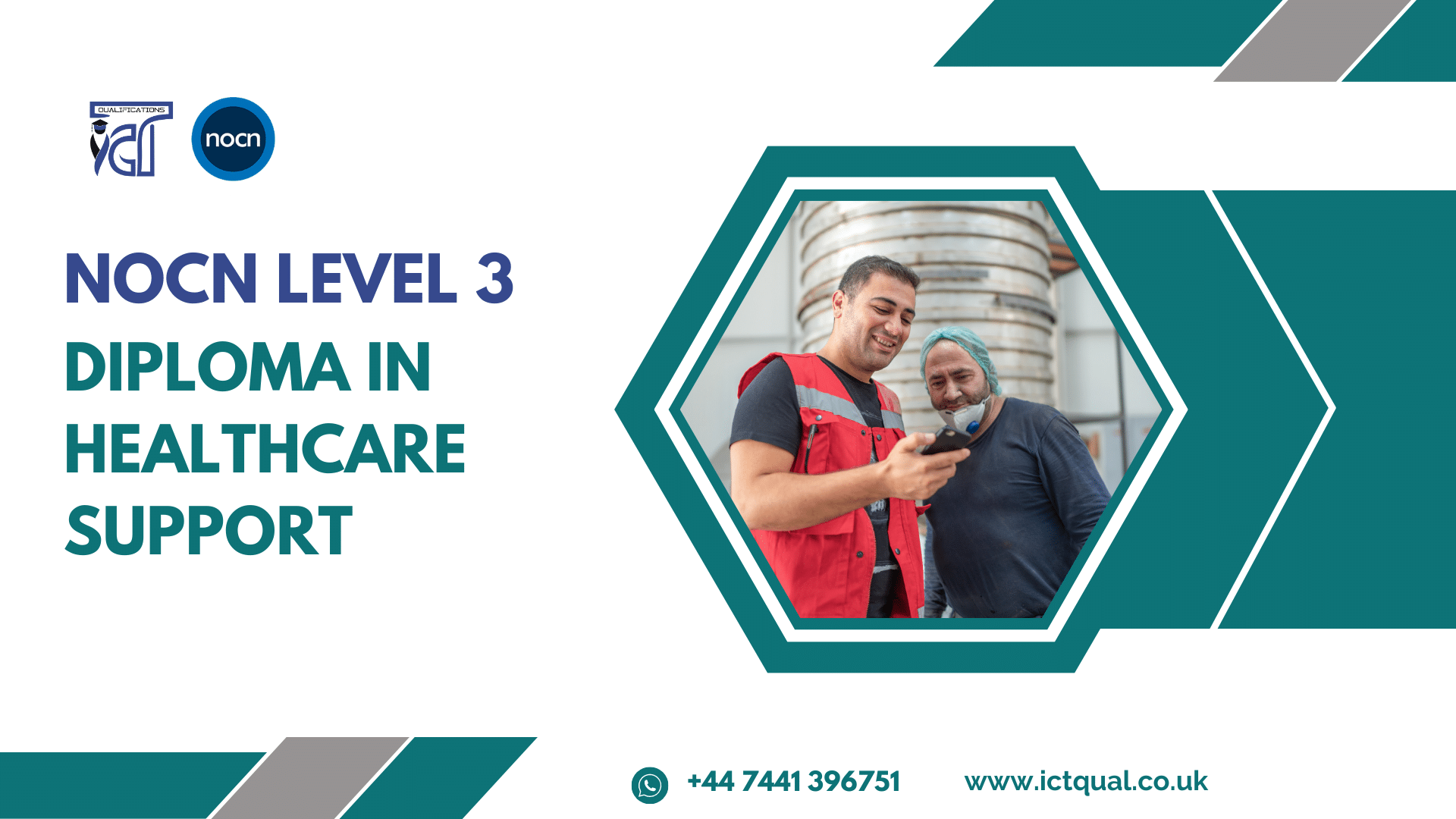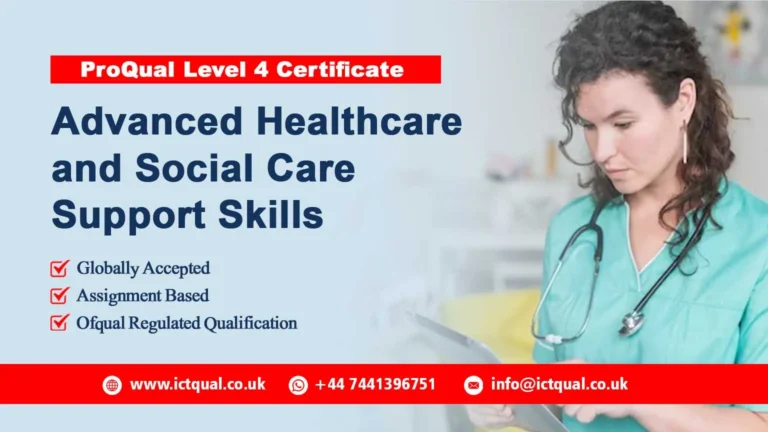Unlock Your Potential with the NOCN Level 3 Diploma in Healthcare Support!
In the ever-evolving field of healthcare, the demand for skilled and knowledgeable support staff is greater than ever. The NOCN Level 3 Diploma in Healthcare Support is designed to provide individuals with the essential skills and qualifications needed to excel in various roles within the healthcare sector.
Whether you’re looking to enhance your current role or aspire to move into a more advanced position, this diploma offers a pathway to achieving your career goals.
The NOCN Level 3 Diploma in Healthcare Support is a comprehensive qualification aimed at individuals who are already working or intend to work in healthcare support roles. This diploma provides a robust foundation in healthcare support, focusing on both theoretical knowledge and practical skills required to support patients and healthcare professionals effectively. It’s an ideal qualification for those seeking to advance their careers in healthcare settings, such as hospitals, clinics, and care homes.
The Level 3 Diploma is designed to enhance the competencies of healthcare support workers by providing them with a deep understanding of healthcare practices and patient care. This qualification is particularly beneficial for those who wish to take on more responsibility within their roles or pursue career advancement opportunities.
By obtaining this diploma, you demonstrate a commitment to professional development and a readiness to handle more complex healthcare tasks.
The Level 3 Diploma is designed to enhance the competencies of healthcare support workers by providing them with a deep understanding of healthcare practices and patient care. This qualification is particularly beneficial for those who wish to take on more responsibility within their roles or pursue career advancement opportunities.
By obtaining this diploma, you demonstrate a commitment to professional development and a readiness to handle more complex healthcare tasks.
The NOCN Level 3 Diploma in Healthcare Support is an invaluable qualification for those looking to advance their careers in the healthcare sector. By providing comprehensive training in healthcare support skills, communication, and regulatory standards, this diploma prepares you to excel in various roles and contribute to high-quality patient care.
Whether you’re looking to enhance your current role or embark on a new career path, the Level 3 Diploma offers the knowledge, skills, and professional recognition needed to achieve your goals. Embrace this opportunity to elevate your career and make a meaningful impact in the field of healthcare.
Don’t miss this golden opportunity to unlock your potential and shape a future where your skills and compassion make a difference. Enroll now in the NOCN Level 3 Diploma in Healthcare Support and embark on a fulfilling career that goes beyond earning a living – it’s about changing lives!
The NOCN Level 3 Diploma in Healthcare Support is a key qualification designed for individuals aiming to advance their skills and career prospects within the healthcare sector. This diploma provides a thorough and practical foundation in healthcare support, equipping learners with the essential knowledge and competencies required to excel in various support roles. It is tailored for those who are either working in or aspiring to work in healthcare environments, such as hospitals, clinics, care homes, and community settings.
The course is structured to cover a broad range of topics that are critical to effective healthcare support. It begins with a focus on fundamental healthcare support skills, where participants learn to assist patients with daily living activities, personal care, and mobility. This foundation is crucial for ensuring that individuals can provide compassionate and competent support to patients, contributing to their overall well-being and comfort.
A significant component of the diploma is dedicated to understanding healthcare environments. Participants explore different types of healthcare settings, gaining insights into the specific protocols, challenges, and needs associated with each. This knowledge helps learners adapt their skills to various contexts and understand their role within multidisciplinary healthcare teams.
Health and safety practices are another core element of the course. Learners are trained in essential health and safety procedures, including infection control, risk assessment, and the safe handling of equipment and medications. This training ensures that healthcare support workers can maintain a safe and hygienic environment, which is paramount for both patient and staff safety.
Communication skills are also emphasized throughout the course. Effective communication is vital in healthcare settings, and participants develop the ability to interact with patients, families, and colleagues in a professional and empathetic manner. The course includes training on handling sensitive situations and providing emotional support, which enhances the overall patient experience.
Personal development and reflection are integral parts of the diploma. Learners engage in activities that foster personal growth and professional reflection, helping them to identify areas for improvement and set goals for continuous development. This reflective practice encourages ongoing learning and skill enhancement.
Finally, the course covers regulatory and ethical considerations in healthcare support. Participants learn about patient rights, confidentiality, and the ethical standards governing healthcare practice. This knowledge ensures that healthcare support workers adhere to professional boundaries and maintain high standards of care.
Overall, the NOCN Level 3 Diploma in Healthcare Support provides a comprehensive education that prepares individuals for a range of roles within the healthcare sector. It combines theoretical knowledge with practical skills, ensuring that graduates are well-equipped to contribute effectively to patient care and support. Whether you are looking to enhance your current role or pursue new opportunities in healthcare, this diploma offers the foundation needed to advance your career and make a meaningful impact in the field.
NOCN Level 3 Diploma in Healthcare Support training program consist of 65 credits, 650 TQT (Total Qualification time).
Study Units
| Sr# | Units Titles | Credit Value |
|---|---|---|
| 1 | Adapt and fit healthcare equipment, medical devices, assistive technology, or products, to meet individuals’ needs | 6 |
| 2 | Administer medication to individuals and monitor the effects | 5 |
| 3 | Administer oral nutritional products to individuals | 4 |
| 4 | Advise and inform individuals on managing their condition | 5 |
| 5 | Anatomy and Physiology for Maternity Support Workers | 2 |
| 6 | Assist and support individuals to use alternative and augmentative communication systems (AAC) | 5 |
| 7 | Assist in implementing treatment programmes for individuals with severely reduced movement/mobility | 5 |
| 8 | Assist in planning and evaluating learning activities | 3 |
| 9 | Assist in receiving, handling and dispatching clinical specimens | 2 |
| 10 | Assist in testing individuals’ abilities prior to planning physical activities | 5 |
| 11 | Assist in the administration of oxygen | 5 |
| 12 | Assist in the delivery of perioperative care and support to individuals | 4 |
| 13 | Assist in the implementation of programmes to increase mobility, movement and functional independence | 4 |
| 14 | Assist individuals who have mental health problems when they are transferring between agencies and services | 2 |
| 15 | Assist others to monitor individuals’ progress in managing dysphagia | 5 |
| 16 | Assist others to plan presentations | 2 |
| 17 | Assist professionals to support individuals from diverse linguistic and cultural backgrounds to access speech and language therapy services | 5 |
| 18 | Assist the practitioner to carry out health care activities | 2 |
| 20 | Awareness of the Mental Capacity Act 2005 | 3 |
| 21 | Care for a newborn baby | 4 |
| 22 | Care for individuals with naso-gastric tubes | 3 |
| 23 | Care for individuals with urethral catheters | 4 |
| 24 | Care for the elderly | 2 |
| 25 | Care for the physical and nutritional needs of babies and young children | 6 |
| 26 | Carry out arterial puncture and collect arterial blood | 4 |
| 27 | Carry out blood collection from fixed or central lines | 4 |
| 28 | Carry out intravenous infusion | 4 |
| 29 | Carry out vision screening | 4 |
| 30 | Carry out wound drainage care | 4 |
| 31 | Causes and Spread of Infection | 2 |
| 32 | Cleaning, Decontamination and Waste Management | 2 |
| 33 | Collaborate in the assessment of environmental and social support in the community | 4 |
| 34 | Collate and communicate health information to individuals | 2 |
| 35 | Communicate with children and young people in care settings | 4 |
| 36 | Communicate with individuals about promoting their health and wellbeing | 3 |
| 37 | Conduct External Ear Examinations | 4 |
| 38 | Conduct hearing assessments | 4 |
| 39 | Conduct routine maintenance on clinical equipment | 4 |
| 40 | Contribute to monitoring the health of individuals affected by health conditions | 2 |
| 41 | Contribute to the discharge of individuals to carers | 3 |
| 42 | Contribute to the effectiveness of teams | 2 |
| 43 | Contribute to the safe use of medical devices in the perioperative environment | 4 |
| 44 | Control the use of physical resources in a health setting | 3 |
| 45 | Coordinate the progress of individuals through care pathways | 4 |
| 46 | Deliver exercise sessions to improve individuals’ health and wellbeing | 5 |
| 47 | Deliver training through demonstration and instruction | 3 |
| 48 | Dementia Awareness | 2 |
| 49 | Develop activities and materials to enable individuals to reach specific communication goals | 5 |
| 50 | Develop and agree individualised care plans for babies and families | 5 |
| 51 | Develop and prepare speech and language therapy resources for alternative and augmentative communication (AAC) use | 4 |
| 52 | Develop positive relationships with children and young people | 4 |
| 53 | Duty of care in care settings | 1 |
| 54 | Effective communication and building relationships in mental health work | 5 |
| 55 | Enable children and young people to understand their health and well-being | 5 |
| 56 | Enable individuals to develop strategies to manage their behaviour | 8 |
| 57 | Enable individuals with mental health problems to develop alternative coping strategies | 4 |
| 58 | Enable mental health service users and carers to manage change | 3 |
| 59 | End of life and dementia care | 2 |
| 60 | Examine the feet of individuals with diabetes | 3 |
| 61 | Facilitate and monitor housing and accommodation services to support individuals with mental health needs | 5 |
| 62 | Facilitate learning and development activities to meet individual needs and preferences | 5 |
| 63 | Give presentations to groups | 4 |
| 64 | Human Structure and Functionality | 8 |
| 65 | Implement hydrotherapy programmes for individuals and groups | 5 |
| 66 | Implement therapeutic group activities | 4 |
| 67 | Inform an individual of discharge arrangements | 2 |
| 68 | Insert and secure nasogastric tubes | 4 |
| 69 | Interact with and support individuals using telecommunications | 5 |
| 70 | Maintaining quality standards in the health sector | 2 |
| 71 | Make recommendations for the use of physical resources in a health setting | 4 |
| 72 | Manage the availability of physical resources to meet service delivery needs in a health setting | 5 |
| 73 | Managing symptoms in end of life care | 4 |
| 74 | Manufacture equipment or medical devices for individuals within healthcare | 4 |
| 75 | Measure and record individuals’ body fluid balance in a perioperative environment | 4 |
| 76 | Monitor and maintain the environment and resources during and after health care activities | 3 |
| 77 | Monitor and review individuals’ progress in relation to maintaining optimum nutritional status | 3 |
| 78 | Monitor individuals’ progress in relation to managing their body weight and nutrition | 3 |
| 79 | Move and position individuals in accordance with their care plan | 4 |
| 80 | Obtain a client history | 3 |
| 81 | Obtain and test capillary blood samples | 4 |
| 82 | Obtain and test specimens from individuals | 2 |
| 83 | Obtain venous blood samples | 3 |
| 84 | Operate equipment for intraoperative cell salvage blood collection | 5 |
| 85 | Operate equipment for intraoperative cell salvage blood processing and complete intraoperative cell salvage blood process | 5 |
| 86 | Perform first line calibration on clinical equipment to ensure it is fit for use | 3 |
| 87 | Perform intravenous cannulation | 5 |
| 88 | Perform routine electrocardiograph (ECG) procedures | 4 |
| 89 | Perform the non-scrubbed circulating role for perioperative procedures | 3 |
| 90 | Prepare anaesthetic environment and provide support for pre and post operative anaesthesia and recovery | 5 |
| 91 | Prepare and apply dressings and drains to individuals in the perioperative environment | 2 |
| 92 | Prepare and dress for scrubbed clinical roles | 4 |
| 93 | Prepare and provide surgical instrumentation and supplementary items for the surgical team | 6 |
| 94 | Prepare equipment for intraoperative cell salvage blood collection | 2 |
| 95 | Prepare equipment for intraoperative cell salvage blood processing | 4 |
| 96 | Prepare for and carry out extended feeding techniques | 4 |
| 97 | Prepare individuals for healthcare activities | 2 |
| 98 | Principles of Health Promotion | 2 |
| 99 | Promote communication in care settings | 3 |
| 100 | Promote effective handling of information in care settings | 2 |
| 101 | Promote equality and inclusion in care settings | 2 |
| 102 | Promote health, safety and wellbeing in care settings | 6 |
| 103 | Promote person-centred approaches in care settings | 6 |
| 104 | Promote Positive Behaviour | 6 |
| 105 | Promotion of General Health and Well-being | 2 |
| 106 | Provide advice and information to enable parents to promote the health and well-being of their newborn babies | 3 |
| 107 | Provide advice on foot care for individuals with diabetes | 4 |
| 108 | Provide agreed support for foot care | 3 |
| 109 | Provide information and advice to individuals on eating to maintain optimum nutritional status | 5 |
| 110 | Provide support for individuals with communication and interaction difficulties | 5 |
| 111 | Provide support for leisure activities | 3 |
| 112 | Provide support for mobility | 2 |
| 113 | Provide support for sleep | 2 |
| 114 | Provide support to individuals to continue recommended therapies | 3 |
| 115 | Provide support to maintain and develop skills for everyday life | 4 |
| 116 | Provide support to manage pain and discomfort | 2 |
| 117 | Provide support to the surgical team when preparing individuals for operative and invasive procedures | 4 |
| 118 | Receive and handle clinical specimens within the sterile field | 4 |
| 119 | Recognise indications of substance misuse and refer individuals to specialists | 4 |
| 120 | Remove wound closure materials | 3 |
| 121 | Remove wound drains | 4 |
| 122 | Reprocess endoscopy equipment | 4 |
| 123 | Responsibilities of a care worker | 2 |
| 124 | Safeguarding and protection in care settings | 3 |
| 125 | Select and wear appropriate personal protective equipment for work in healthcare settings | 2 |
| 126 | Service improvement in the health sector | 3 |
| 127 | Support carers to meet the care needs of individuals | 4 |
| 128 | Support Child and Young Person Development | 3 |
| 129 | Support children and young people experiencing transitions | 3 |
| 130 | Support children and young people with additional needs | 6 |
| 131 | Support children and young people with mental health conditions | 5 |
| 132 | Support independence in the tasks of daily living | 5 |
| 133 | Support individuals at the end of life | 6 |
| 134 | Support individuals during a period of change | 4 |
| 135 | Support individuals during emergency situations | 3 |
| 136 | Support individuals during the last days of life | 5 |
| 137 | Support individuals in undertaking their chosen activities | 4 |
| 138 | Support individuals to access and manage direct payments | 4 |
| 139 | Support individuals to access and use information about services and facilities | 3 |
| 140 | Support individuals to access and use services and facilities | 4 |
| 141 | Support individuals to access education, training or employment | 4 |
| 142 | Support individuals to access housing and accommodation services | 4 |
| 143 | Support individuals to carry out their own health care procedures | 2 |
| 144 | Support individuals to develop and run support groups | 3 |
| 145 | Support individuals to eat and drink | 2 |
| 146 | Support individuals to live at home | 4 |
| 147 | Support individuals to manage continence | 3 |
| 148 | Support individuals to manage dysphagia | 5 |
| 149 | Support individuals to manage their finances | 3 |
| 150 | Support individuals to manage their own recovery from mental health problems | 3 |
| 151 | Support Individuals to Meet Personal Care Needs | 2 |
| 152 | Support individuals to prepare for and settle in to new home environments | 3 |
| 153 | Support individuals undergoing healthcare activities | 3 |
| 154 | Support individuals who are bereaved | 4 |
| 155 | Support individuals who are distressed | 3 |
| 156 | Support individuals with cognition or learning difficulties | 5 |
| 157 | Support individuals with feeding babies | 4 |
| 158 | Support Individuals With Specific Communication Needs | 5 |
| 159 | Support individuals with speech and language disorders to develop their communication skills | 4 |
| 160 | Support parents or carers to interact with and care for their newborn baby | 4 |
| 161 | Support parents/carers and those in a parental role to care for babies during their first year | 5 |
| 162 | Support positive risk taking for individuals | 4 |
| 163 | Support the spiritual wellbeing of individuals | 3 |
| 164 | Supporting individuals with loss and grief before death | 2 |
| 165 | The Principles of Infection Prevention and Control | 3 |
| 166 | Transport, transfer and position individuals and equipment within the perioperative environment | 5 |
| 167 | Understand Advance Care Planning | 3 |
| 168 | Understand care and support planning and risk management in mental health | 4 |
| 169 | Understand Child and Young Person Development | 4 |
| 170 | Understand end of life care for individuals with specific health needs | 4 |
| 171 | Understand How to Safeguard the Wellbeing of Children and Young People | 3 |
| 172 | Understand Long Term Conditions and Frailty | 3 |
| 173 | Understand mental health and behaviour management of children and young people | 4 |
| 174 | Understand mental health interventions | 4 |
| 175 | Understand mental health problems | 3 |
| 176 | Understand mental well-being and mental health promotion | 3 |
| 177 | Understand risk management in the paediatric mental health setting | 3 |
| 178 | Understand the administration of Medication | 3 |
| 179 | Understand the context of supporting individuals with learning disabilities | 4 |
| 180 | Understand the legal, policy and service framework in mental health | 5 |
| 181 | Understand the process and experience of dementia | 3 |
| 182 | Understanding Suicide Interventions | 6 |
| 183 | Undertake agreed pressure area care | 4 |
| 184 | Undertake personal hygiene activities with individuals | 3 |
| 185 | Undertake physiological measurements | 3 |
| 186 | Undertake stoma care | 4 |
| 187 | Undertake tissue viability risk assessments | 3 |
| 188 | Undertake treatments and dressings of lesions and wounds | 4 |
| 189 | Undertake urethral catheterisation processes | 4 |
| 190 | Work in partnership with families to support individuals | 3 |
| 191 | Work with babies and young children to support their development and learning | 6 |
The “NOCN Level 3 Diploma in Healthcare Support” course is specifically designed for individuals who aspire to build a rewarding and fulfilling career in the healthcare sector. This comprehensive program caters to a diverse range of learners, including:
- Aspiring Healthcare Professionals: The course is ideal for individuals who dream of entering the healthcare industry and desire to play a crucial role in providing essential support and care to patients.
- Current Healthcare Assistants: Healthcare assistants seeking to enhance their skills, knowledge, and career prospects will benefit from this diploma, as it equips them with advanced competencies and a deeper understanding of patient care.
- Care Support Workers: For individuals working as care support workers, this course provides an excellent opportunity to expand their expertise and explore various healthcare settings.
- Individuals Passionate about Patient Care: Those who have a genuine passion for helping others and providing compassionate patient care will find this course highly fulfilling and aligned with their values.
- Career Changers: If you are considering a career change into the healthcare sector, this diploma offers a solid foundation, equipping you with the necessary skills to transition smoothly into a healthcare support role.
- High School Graduates: Recent high school graduates seeking an entry point into the healthcare field will find this course an excellent stepping stone to launch their healthcare careers.
- Mature Learners: The course welcomes mature learners who wish to pursue a meaningful career in healthcare and have life experiences that contribute to their commitment and understanding of patient care.
- Individuals Seeking Personal Growth: Those looking to develop personal attributes, such as empathy, communication, and problem-solving skills, will find this course enriching and transformative.
The “NOCN Level 3 Diploma in Healthcare Support” course is inclusive and accessible to learners from diverse backgrounds, united by their shared passion for making a positive impact in the lives of patients. Whether you are starting your journey in healthcare or seeking to advance your existing career, this course provides the essential tools and knowledge to become a valued and compassionate healthcare professional.
Upon successful completion of the NOCN Level 3 Diploma in Healthcare Support, participants will be able to:
- Demonstrate Advanced Healthcare Support Skills:
- Provide effective assistance with daily living activities, personal care, and mobility support for patients, ensuring their comfort and well-being.
- Apply best practices in patient care to deliver high-quality support in various healthcare settings.
- Understand Healthcare Environments:
- Identify and describe the different types of healthcare environments and their specific protocols, challenges, and needs.
- Adapt support practices to meet the requirements of diverse healthcare settings, including hospitals, clinics, care homes, and community services.
- Apply Health and Safety Practices:
- Implement essential health and safety procedures, including infection control measures, risk assessment, and the safe handling of equipment and medications.
- Ensure a safe, hygienic, and compliant environment for both patients and healthcare professionals.
- Communicate Effectively:
- Develop and utilize effective communication skills to interact professionally and empathetically with patients, families, and healthcare colleagues.
- Handle sensitive situations with care, providing appropriate emotional support and clear information to patients and their families.
- Engage in Personal Development and Reflection:
- Participate in personal development activities to enhance skills, knowledge, and professional practice.
- Reflect on practice to identify areas for improvement and set goals for continuous professional growth.
- Adhere to Regulatory and Ethical Standards:
- Understand and apply regulatory and ethical standards related to healthcare support, including patient rights, confidentiality, and professional boundaries.
- Maintain high standards of professionalism and ethical behavior in all aspects of patient care and support.
- Assist in the Implementation of Healthcare Procedures:
- Support the implementation of healthcare procedures and protocols in accordance with organizational policies and best practices.
- Contribute to the effective operation of healthcare teams by following established guidelines and protocols.
- Evaluate and Improve Care Practices:
- Assess the effectiveness of care and support practices, identifying areas for improvement and contributing to the development of enhanced care strategies.
- Use feedback and evidence to inform and improve personal and team-based care practices.
By achieving these outcomes, participants will be well-prepared to excel in healthcare support roles, demonstrating a high level of competence and professionalism in delivering patient care and contributing to the effective operation of healthcare settings.







